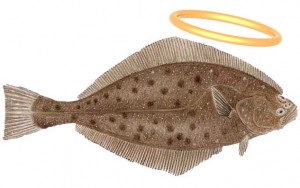LONG STORY SHORT: I was looking for citation dates for buss beggar (someone who would kiss a beggar) and buz-bloke (a pickpocket) in Teall’s 1892 book English Compound Words and Phrases, and I stumbled upon this entry:
You saw that right: buttwoman.
I giggled. Then I went to the OED. I skipped the 1st definition and saw this one, which I immediately started saying in an outrageous manner:
Imagine what an irate version of that definition might sound like. Ok? Now listen to my ludicrous reading here:
It turns out that butt is another name for some kinds of flat fish, such as sole and fluke. You can see that root in the word halibut. The OED’s best guess for halibut is that hali means holy, named for the tradition of eating halibut on holy days. I’ve commented on Anatoly Liberman’s second excellent fishy post about this strange series of events. I hope he responds. I hope he never reads it. I hope he adopts me. I hope I erase this part.
So. Halibut means holy fish, but really, it’s fun to only change the first half, and pretend that halibut means holy butt. Because I’m childish.
This also means that a buttwoman is just a female fishmonger, a sassy seafood vendor. Nothing inappropriate after all. In the end, not even butt weld is naughty.
Who sells these… a fish wife?!
August 7, 2012



{ 1 comment… read it below or add one }
Anatoly Liberman. You’ve given me quite a few bookmarked websites; I love ’em.